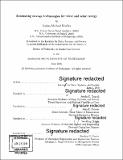Evaluating storage technologies for wind and solar energy
Author(s)
Mueller, Joshua M. (Joshua Michael), 1982-
Download1052619752-MIT.pdf (16.21Mb)
Other Contributors
Massachusetts Institute of Technology. Institute for Data, Systems, and Society.
Terms of use
Metadata
Show full item recordAbstract
Rapidly falling wind and solar energy costs over the past four decades have led to exponential growth in installation of these technologies. However, these intermittent renewables do not reliably produce power on demand. One possible mitigation strategy is the addition of energy storage technologies, which are able to shift generation to later periods of higher demand or price. In competitive markets, storage adoption to facilitate renewables penetration will depend on how much value storage can bring to a wind or solar power plant. Which of the diverse energy storage technologies are best suited to profitably perform this function? How do price and resource variability determine the preferred technologies? This thesis develops two novel methods of comparing storage technologies in hybrid wind-storage or solar-storage power plants. In the first, we evaluate technologies based on the increased value of a marginal hybrid plant under today's conditions. We further explain these results by finding the determinants of storage value under uncertainty. In the second, we find the least-cost hybrid plants able to meet predefined demand profiles. Through simulation, optimization, and statistical analysis, we address the following questions: 1) How can one compare candidate storage technologies? 2) What price and resource features determine storage value? 3) What are the cost targets for storage under different market conditions? To address question 1, we optimize storage operation and size for grid-scale energy arbitrage, and study the value of hybrid plants using different storage technologies. The value of the hybrid plant is found by comparing benefits to costs, and is estimated across locations and technologies. We show that at today's wind and solar generation costs, some storage technologies can provide value, but further cost improvement is needed, especially for electrochemical technologies, to facilitate widespread adoption. Finally, we determine both cost targets and the optimal direction of cost improvement for diverse storage technologies and locations. In order to answer question 2, we identify features of the electricity market and the renewables resource availability that determine value. Through simulations of an artificial price time series in which features of electricity price spikes are varied, we find that storage value is driven by the frequency and amplitude of price spikes and the availability of the energy resource. The durations of price spikes determine the relative value of one storage technology to another, because of differing technology cost structures. We demonstrate these results in historical data and explain the differences in storage value across locations. We also explore how uncertainty in future prices impacts storage value. We determine a new heuristic for storage operation and sizing absent perfect foresight. This approach is able to capture at least 80% of the expected value under perfect foresight and improves upon existing heuristics. In answering question 3, we determine the least-cost combination of wind and solar with storage that provides reliable, dispatchable, pre-determined outputs. This approach allows for the evaluation of storage technologies for a possible future with higher renewables penetration. Preferred technologies for this use context have very low energy capacity costs (< $50/kWh), enabling inexpensive installation of long duration storage. Long periods of low wind or solar availability determine storage requirements and can be mitigated by including both wind and solar in the generation portfolio. New cost targets are derived for storage development that would help enable higher levels of renewables adoption.
Description
Thesis: Ph. D. in Engineering Systems, Massachusetts Institute of Technology, School of Engineering, Institute for Data, Systems, and Society, 2018 Cataloged from PDF version of thesis. Includes bibliographical references (pages 125-135).
Date issued
2018Department
Massachusetts Institute of Technology. Institute for Data, Systems, and SocietyPublisher
Massachusetts Institute of Technology
Keywords
Institute for Data, Systems, and Society.